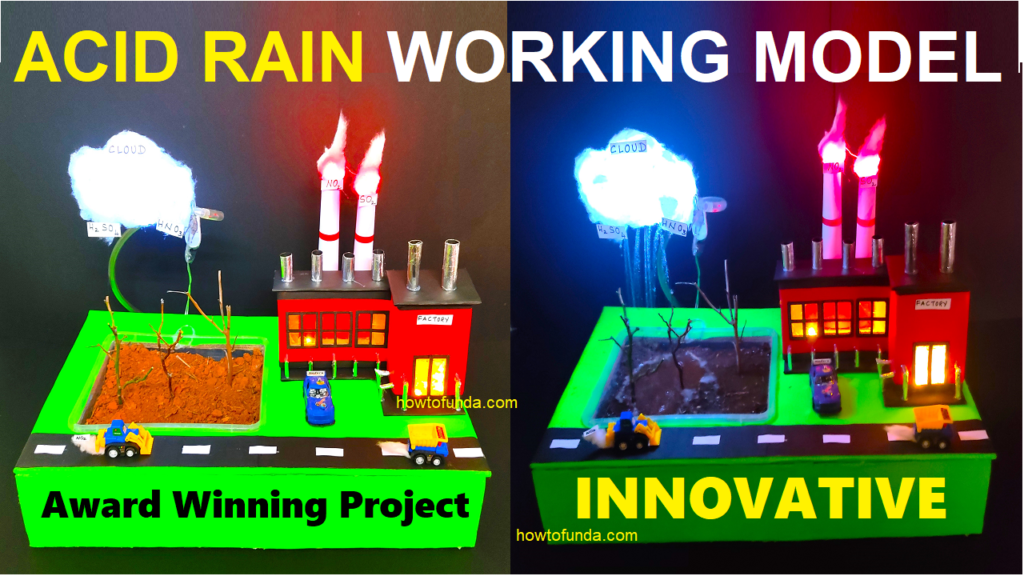
Acid Rain:
- Definition:
- Acid Rain: Acid rain is precipitation with a lower-than-normal pH, primarily caused by the presence of pollutants like sulfur dioxide (SO₂) and nitrogen oxides (NOₓ) in the atmosphere.
- Causes:
- Acid Rain: Mainly caused by human activities, such as burning fossil fuels and industrial processes, releasing sulfur dioxide and nitrogen oxides into the air.
- Effects:
- Acid Rain: Harms aquatic ecosystems, damages soil, forests, and buildings. It can affect human health indirectly by contributing to air pollution.
- Global Impact:
- Acid Rain: While it can have widespread regional effects, its impact is more localized compared to global phenomena like global warming.
Global Warming:
- Definition:
- Global Warming: Refers to the long-term increase in Earth’s average surface temperature, primarily attributed to human activities like the burning of fossil fuels and deforestation.
- Causes:
- Global Warming: Mainly caused by the accumulation of greenhouse gases (GHGs), such as carbon dioxide (CO₂), methane (CH₄), and nitrous oxide (N₂O), in the atmosphere, trapping heat.
- Effects:
- Global Warming: Leads to rising sea levels, changes in weather patterns, more frequent and severe heatwaves, melting ice caps, and disruptions to ecosystems and biodiversity.
- Global Impact:
- Global Warming: Has a widespread and far-reaching impact on the entire planet, affecting various aspects of climate and ecosystems globally.
Greenhouse Effect:
- Definition:
- Greenhouse Effect: Describes the natural process where certain gases in Earth’s atmosphere trap and retain heat from the sun, maintaining a temperature suitable for life.
- Causes:
- Greenhouse Effect: Natural greenhouse gases, such as water vapor, carbon dioxide, methane, and nitrous oxide, contribute to this effect. Human activities enhance the greenhouse effect by releasing additional greenhouse gases.
- Effects:
- Greenhouse Effect: Essential for maintaining Earth’s temperature. However, human-induced enhancement contributes to global warming, leading to climate change.
- Global Impact:
- Greenhouse Effect: A fundamental and natural process crucial for life on Earth. The enhanced greenhouse effect due to human activities has significant global consequences, contributing to global warming.
Key Differences:
- Scope of Impact:
- Acid Rain: Primarily localized impact on specific regions with high pollution levels.
- Global Warming: Widespread impact affecting the entire planet.
- Greenhouse Effect: A natural process crucial for maintaining Earth’s temperature.
- Causes:
- Acid Rain: Caused by pollutants released from burning fossil fuels and industrial processes.
- Global Warming: Caused by the accumulation of greenhouse gases from human activities.
- Greenhouse Effect: A natural process intensified by human-induced greenhouse gas emissions.
- Effects on Temperature:
- Acid Rain: Does not directly influence Earth’s temperature.
- Global Warming: Leads to an increase in Earth’s average surface temperature.
- Greenhouse Effect: Maintains Earth’s temperature within a habitable range.
- Time Scale:
- Acid Rain: Immediate and localized effects.
- Global Warming: Gradual and long-term changes over decades and centuries.
- Greenhouse Effect: Ongoing and continuous process.
In summary, acid rain, global warming, and the greenhouse effect are distinct phenomena with different causes, effects, and global impacts.
While acid rain is a localized environmental issue, global warming and the enhanced greenhouse effect have far-reaching consequences on a global scale.

